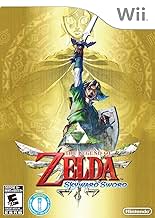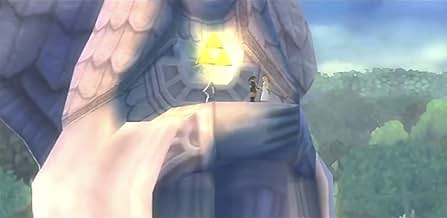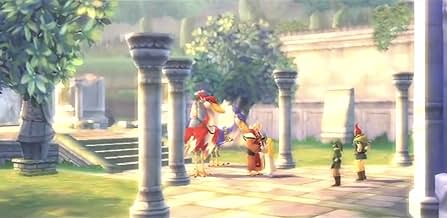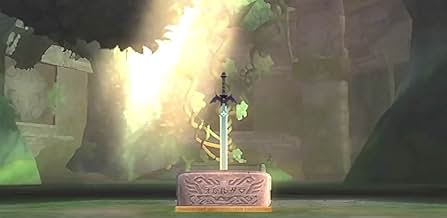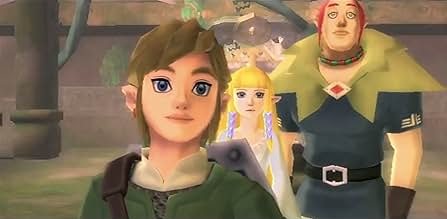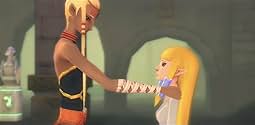The Legend of Zelda: Skyward Sword
Titre original : Zeruda no densetsu: Sukaiwôdo sôdo
NOTE IMDb
8,2/10
2,8 k
MA NOTE
Ajouter une intrigue dans votre langueBorn on an island suspended in the sky, a young man, Link, accepts his destiny to venture to the world below to save his childhood friend, Zelda, and the land from evil forces through the us... Tout lireBorn on an island suspended in the sky, a young man, Link, accepts his destiny to venture to the world below to save his childhood friend, Zelda, and the land from evil forces through the use of a mysterious sword.Born on an island suspended in the sky, a young man, Link, accepts his destiny to venture to the world below to save his childhood friend, Zelda, and the land from evil forces through the use of a mysterious sword.
- Nomination aux 2 BAFTA Awards
- 3 victoires et 11 nominations au total
Takashi Ôhara
- Link
- (voix)
- (as Takashi Oohara)
Ayumi Fujimura
- Fi
- (voix)
Yû Shimamura
- Zelda
- (voix)
- (as Yu Shimamura)
Anri Katsu
- Ghirahim
- (voix)
Kenji Takahashi
- Groose
- (voix)
Rei Shimoda
- Impa
- (voix)
Takashi Nagasako
- Demise
- (voix)
- (non crédité)
Avis à la une
(www.plasticpals.com) Nintendo returns to the Legend of Zelda series once again with Skyward Sword, but they've managed to create a fairly unique world for the game, with childhood friends Link and Zelda living in the floating island town called Skyloft. The game begins as Link is about to compete in an annual competition to see who will become the town's next knight.
Being that this is the first Zelda title built from the ground up for the Wii (Twilight Princess was initially developed for the Gamecube), Nintendo really tried to get the most out of the Wii's motion controls. They ended up going with the enhanced functionality of the Wii Motion Plus, which is better able to track the orientation of the remote.
There are a slew of new and returning items to use, and most of them take advantage of the Wii remote's functionality. The designers even managed to find a new way to use bombs (you can now roll them on the ground like a bowling ball), which is great to see after all these years. It's one of the few Wii games where the motion controls feel tightly integrated with the game play.
New Ideas: Critics have begun to question if the Zelda series needs to evolve, and in response there are a couple of new concepts introduced which are a step in the right direction. The biggest addition is the stamina system, which allows Link to sprint for a few seconds. You can now sprint towards a wall and Link will jump up and grab onto a ledge if one exists. He can also overcome small obstacles by hopping over them. Stamina can also be used to quickly maneuver while climbing. It's a great addition that really helps take some of the monotony out of normal actions.
Another new concept is the upgrade system, which allows you to trade in loot to enhance equipment. Loot comes in many forms, from the insects you collect with a bug-catching net to rare trinkets found throughout the world. It's a decent system, but it does mean there are fewer mini-games to be played (where Link would normally acquire item upgrades). I'm not sure the trade-off is worth it, but if the system could be refined or applied only to certain types of equipment in future games it could really benefit the series. You can also infuse potions with insects to create more powerful effects, which is another good idea, and any excess loot can be traded for rupees if you're short on cash. However, the constant sub-screen prompts when you pick up an item – once per item per game session – is very annoying.
By far one of the best new ideas in Skyward Sword are the time crystals, which dynamically alter the world around them when activated. These crystals are only found in one of the game's major areas but makes for some of the most inventive puzzles and game play situations. It would be a shame if this sort of thing didn't make another appearance in future titles. Less exciting are the underground passages which Link can dig into. Here the game switches to an overhead view of Link crawling through a maze of tunnels.
Not so great is the new storage system, which is only useful because Link has a limited number of item pouches. Even when you've got the full eight item pouches you won't have room to store everything you'd like to carry at once (larger quiver, bomb bag, slingshot ammo, bottles, etc.). It means you'll have to compromise on what extras you carry, which I suppose adds to the game's difficulty slightly, but if that is its only purpose than it is slightly annoying. Related to this are the wallets, which come in various sizes and can only store a certain number of rupees – it's one of those elements which has hung around since the N64 days designed to limit you from buying items up too quickly.
Presentation: As with The Windwaker, Skyward Sword is set apart with a unique visual effect, though this time it is a bit more subtle. A depth of field effect dissolves the background into paint splotches, which succeeds in giving the graphics an impressionistic feel. Although it is just a filter effect, it can create some picturesque vistas. This is also the first Zelda title with an orchestral score, which is a major step for the franchise. However the lack of voice overs, which leaves the characters silently miming their dialogue during the many story sequences, detracts from the presentation. It may be time to include optional voice-overs.
One of the problems I have with Skyward Sword's art direction are the monster and creature designs. While the bosses are generally quite cool looking, the majority of the monsters (and friendly creatures) introduced in the game are a bit wonky. It feels half way between the style of The Windwaker and that of Twilight Princess, and falls short of both. And the game lacks the dynamic time and weather effects of earlier games, which is disappointing. At least they let you choose from a number of HUD options, preventing the regular HUD from cluttering the screen.
Conclusion: The Legend of Zelda Skyward Sword is another excellent chapter in this long-running and much beloved series, and introduces some new ideas and game play concepts to keep things from becoming stale. It offers around 35 to 40 hours of questing and has an optional "Hero" mode for those seeking a greater difficulty. The new Wii-motion Plus controls add to the experience and the painterly visuals and symphonic score round out the package. It's not a perfect game, but the issues are relatively minor ones, so it's an easy recommendation.
Being that this is the first Zelda title built from the ground up for the Wii (Twilight Princess was initially developed for the Gamecube), Nintendo really tried to get the most out of the Wii's motion controls. They ended up going with the enhanced functionality of the Wii Motion Plus, which is better able to track the orientation of the remote.
There are a slew of new and returning items to use, and most of them take advantage of the Wii remote's functionality. The designers even managed to find a new way to use bombs (you can now roll them on the ground like a bowling ball), which is great to see after all these years. It's one of the few Wii games where the motion controls feel tightly integrated with the game play.
New Ideas: Critics have begun to question if the Zelda series needs to evolve, and in response there are a couple of new concepts introduced which are a step in the right direction. The biggest addition is the stamina system, which allows Link to sprint for a few seconds. You can now sprint towards a wall and Link will jump up and grab onto a ledge if one exists. He can also overcome small obstacles by hopping over them. Stamina can also be used to quickly maneuver while climbing. It's a great addition that really helps take some of the monotony out of normal actions.
Another new concept is the upgrade system, which allows you to trade in loot to enhance equipment. Loot comes in many forms, from the insects you collect with a bug-catching net to rare trinkets found throughout the world. It's a decent system, but it does mean there are fewer mini-games to be played (where Link would normally acquire item upgrades). I'm not sure the trade-off is worth it, but if the system could be refined or applied only to certain types of equipment in future games it could really benefit the series. You can also infuse potions with insects to create more powerful effects, which is another good idea, and any excess loot can be traded for rupees if you're short on cash. However, the constant sub-screen prompts when you pick up an item – once per item per game session – is very annoying.
By far one of the best new ideas in Skyward Sword are the time crystals, which dynamically alter the world around them when activated. These crystals are only found in one of the game's major areas but makes for some of the most inventive puzzles and game play situations. It would be a shame if this sort of thing didn't make another appearance in future titles. Less exciting are the underground passages which Link can dig into. Here the game switches to an overhead view of Link crawling through a maze of tunnels.
Not so great is the new storage system, which is only useful because Link has a limited number of item pouches. Even when you've got the full eight item pouches you won't have room to store everything you'd like to carry at once (larger quiver, bomb bag, slingshot ammo, bottles, etc.). It means you'll have to compromise on what extras you carry, which I suppose adds to the game's difficulty slightly, but if that is its only purpose than it is slightly annoying. Related to this are the wallets, which come in various sizes and can only store a certain number of rupees – it's one of those elements which has hung around since the N64 days designed to limit you from buying items up too quickly.
Presentation: As with The Windwaker, Skyward Sword is set apart with a unique visual effect, though this time it is a bit more subtle. A depth of field effect dissolves the background into paint splotches, which succeeds in giving the graphics an impressionistic feel. Although it is just a filter effect, it can create some picturesque vistas. This is also the first Zelda title with an orchestral score, which is a major step for the franchise. However the lack of voice overs, which leaves the characters silently miming their dialogue during the many story sequences, detracts from the presentation. It may be time to include optional voice-overs.
One of the problems I have with Skyward Sword's art direction are the monster and creature designs. While the bosses are generally quite cool looking, the majority of the monsters (and friendly creatures) introduced in the game are a bit wonky. It feels half way between the style of The Windwaker and that of Twilight Princess, and falls short of both. And the game lacks the dynamic time and weather effects of earlier games, which is disappointing. At least they let you choose from a number of HUD options, preventing the regular HUD from cluttering the screen.
Conclusion: The Legend of Zelda Skyward Sword is another excellent chapter in this long-running and much beloved series, and introduces some new ideas and game play concepts to keep things from becoming stale. It offers around 35 to 40 hours of questing and has an optional "Hero" mode for those seeking a greater difficulty. The new Wii-motion Plus controls add to the experience and the painterly visuals and symphonic score round out the package. It's not a perfect game, but the issues are relatively minor ones, so it's an easy recommendation.
With the Legend of Zelda series steadily heading towards its 20th installment, it remains the question whether each new game can live up to certified masterpieces such as A Link to the Past, Ocarina of Time and Twilight Princess. It would seem almost mathematical certainty that raising the bar will become an impossibility at some point. On the other hand, every new generation of console has offered new and exciting opportunities in graphics and game-play that may keep things fresh enough to set a new level of excellence. And if the story supports game-play adequately, a new classic can be within reach.
In Skyward Sword, we venture into the era before Ocarina of Time. The very stylish and pleasantly bombastic prologue comes in the form of stills, just like in A Link to the Past and Wind Waker. We learn of a terrible power struggle in ancient Hyrule, which prompted the Goddess Hylia to separate a piece of land from the earth and send it with its inhabitants into the sky. Thousands of years later, when evil is stirring again, one of these Hylians is sent on a mission to thwart evil and retake the earth. And start an entire legacy in the process.
I am having a few difficulties in giving Skyward Sword its due reward, and not sound sour as well. There is no denying that the game uses the abilities of the Wii remote control system to its strengths. Twilight Princess already experimented with it, to very satisfying results. Skyward Sword further improves the system. In general, Link's weaponry reacts adequately to the player's movements, and the enemies can only be defeated with well-timed and well-placed attacks. It gives a huge feeling of satisfaction to strike down an enemy that anticipates your moves and defends with a mind of its own; the small exceptions being those moments were the Wii Motion Plus has a hard time keeping up, causing you to miss and receive an undeserved beating. The system may not be perfect, but the effort definitely shows off. Especially the boss fights are very well done: challenging and extremely rewarding. The rest of the inventory also uses the interface quite well; firing an arrow never felt so intuitive. This is truly a boy's dream come true.
Now, I always get annoyed by people who criticize sequels for just trying to be original and not slavishly following popular trends, and abandoning popular elements in favor of something new. I will defend The Wind Waker whenever I can, so to all those people who keep complaining that a vast ocean is boring and no worthy substitute for Hyrule Field: please play Ocarina of Time again, run around the field until your feet bleed, and stop complaining! In fact, they made Twilight Princess to make sure that you would! So it pains me to say that Skyward Sword did make me feel some amount of loss: the intricate fighting system. SS features plenty of sword action, but no wicked combos or special moves like in Wind Waker or Twilight Princess. I'd never thought I would miss something from previous incarnations so deeply, especially when there is so much good going around. Shame on me.
Okay, I'll make up with some things that I really like. This being a prequel, we are wondering how the events of SS will finally lead into Ocarina of Time. Why did Hylians live in the sky? How did they end up back on the ground? What is the Triforce? Where does Ganon fit in? Although this is still more of a game in its own right than a strict prequel, there are many tiny references that Ocarina and Twilight Princess afficionados will surely appreciate. As with all Zelda games, the makers show their excellent skills in storytelling once again, and finding out the story as you go is an immensely satisfying experience; one to keep you guaranteed to play until the very end.
The Two World system, a staple of the series since the Light and Dark World from Link to the Past, and the present and future from Ocarina of Time, returns, albeit a bit different. The sky is the traditional overworld, and the savage world below the clouds its counterpart. In the sky, you travel by bird, which makes for some nice moments and an awesome boss battle. I appreciate the creativity that went into this, but admittedly, the Sky World is mainly used for sidequests and the occasional travel, whereas the bulk of the action takes place below. This world has many recognizable features, like a primordial Hyrule. Again, the makers give us some great scenery and original dungeons to traverse, making this the more interesting part of the game by far. A little more importance could have been added to the Sky World, which would have made the two worlds better balanced, as was the case in Link to the Past and Ocarina of Time.
Then again, the side quests and the new inventory system (limited space and upgradeable items/weapons) are good additions, which simply beg to be used or completed. Not that everything works equally well: shields that break, oh please... are they made of plywood? Also, the traditional 'helpful companion' comes in the form of a 'sword spirit' called Fi, whose constant attention-seeking and annoying talent to state the obvious (like your hearts running low) would even give Navi from Ocarina a run for her money. But the time-travel crystals, mechanical beetles and a whip are awesome extras.
So forgive me for some reservations that I have, because I really think this is a great game. It's not exactly game history re-written such as with Ocarina of Time or Link to the Past, but a more than worthy beginning of the saga.
In Skyward Sword, we venture into the era before Ocarina of Time. The very stylish and pleasantly bombastic prologue comes in the form of stills, just like in A Link to the Past and Wind Waker. We learn of a terrible power struggle in ancient Hyrule, which prompted the Goddess Hylia to separate a piece of land from the earth and send it with its inhabitants into the sky. Thousands of years later, when evil is stirring again, one of these Hylians is sent on a mission to thwart evil and retake the earth. And start an entire legacy in the process.
I am having a few difficulties in giving Skyward Sword its due reward, and not sound sour as well. There is no denying that the game uses the abilities of the Wii remote control system to its strengths. Twilight Princess already experimented with it, to very satisfying results. Skyward Sword further improves the system. In general, Link's weaponry reacts adequately to the player's movements, and the enemies can only be defeated with well-timed and well-placed attacks. It gives a huge feeling of satisfaction to strike down an enemy that anticipates your moves and defends with a mind of its own; the small exceptions being those moments were the Wii Motion Plus has a hard time keeping up, causing you to miss and receive an undeserved beating. The system may not be perfect, but the effort definitely shows off. Especially the boss fights are very well done: challenging and extremely rewarding. The rest of the inventory also uses the interface quite well; firing an arrow never felt so intuitive. This is truly a boy's dream come true.
Now, I always get annoyed by people who criticize sequels for just trying to be original and not slavishly following popular trends, and abandoning popular elements in favor of something new. I will defend The Wind Waker whenever I can, so to all those people who keep complaining that a vast ocean is boring and no worthy substitute for Hyrule Field: please play Ocarina of Time again, run around the field until your feet bleed, and stop complaining! In fact, they made Twilight Princess to make sure that you would! So it pains me to say that Skyward Sword did make me feel some amount of loss: the intricate fighting system. SS features plenty of sword action, but no wicked combos or special moves like in Wind Waker or Twilight Princess. I'd never thought I would miss something from previous incarnations so deeply, especially when there is so much good going around. Shame on me.
Okay, I'll make up with some things that I really like. This being a prequel, we are wondering how the events of SS will finally lead into Ocarina of Time. Why did Hylians live in the sky? How did they end up back on the ground? What is the Triforce? Where does Ganon fit in? Although this is still more of a game in its own right than a strict prequel, there are many tiny references that Ocarina and Twilight Princess afficionados will surely appreciate. As with all Zelda games, the makers show their excellent skills in storytelling once again, and finding out the story as you go is an immensely satisfying experience; one to keep you guaranteed to play until the very end.
The Two World system, a staple of the series since the Light and Dark World from Link to the Past, and the present and future from Ocarina of Time, returns, albeit a bit different. The sky is the traditional overworld, and the savage world below the clouds its counterpart. In the sky, you travel by bird, which makes for some nice moments and an awesome boss battle. I appreciate the creativity that went into this, but admittedly, the Sky World is mainly used for sidequests and the occasional travel, whereas the bulk of the action takes place below. This world has many recognizable features, like a primordial Hyrule. Again, the makers give us some great scenery and original dungeons to traverse, making this the more interesting part of the game by far. A little more importance could have been added to the Sky World, which would have made the two worlds better balanced, as was the case in Link to the Past and Ocarina of Time.
Then again, the side quests and the new inventory system (limited space and upgradeable items/weapons) are good additions, which simply beg to be used or completed. Not that everything works equally well: shields that break, oh please... are they made of plywood? Also, the traditional 'helpful companion' comes in the form of a 'sword spirit' called Fi, whose constant attention-seeking and annoying talent to state the obvious (like your hearts running low) would even give Navi from Ocarina a run for her money. But the time-travel crystals, mechanical beetles and a whip are awesome extras.
So forgive me for some reservations that I have, because I really think this is a great game. It's not exactly game history re-written such as with Ocarina of Time or Link to the Past, but a more than worthy beginning of the saga.
I believe this games negative criticism to be absolutely unfair. If you simply either play it on the switch with the normal controllers or actually give the motion sensors a try, it's not as difficult as described and can be a very fun type of gameplay.
I've seen some people call it repetitive and I really don't understand how they can perceive it as such. How do u relate any of these dungeons with one another? The mechanics used are all far too different, the places and atmospheres are each unique and beautiful and the only repetitive boss fights are girahim and imprisoned. The only aspect of this game I dislike is imprisoned, and even he can be fondly remembered imo.
I simply disagree with these people tbh. Game is original, unique, beautiful and super fun.
I've seen some people call it repetitive and I really don't understand how they can perceive it as such. How do u relate any of these dungeons with one another? The mechanics used are all far too different, the places and atmospheres are each unique and beautiful and the only repetitive boss fights are girahim and imprisoned. The only aspect of this game I dislike is imprisoned, and even he can be fondly remembered imo.
I simply disagree with these people tbh. Game is original, unique, beautiful and super fun.
As a Zelda fan this game is crap.
Motion controls are crap.
The gameplay is bad
The dungeons are repetitive.
I loved the Soundtracks, atmosphere, fights,... Everything. I don't know why people hate it so much.
Le saviez-vous
- AnecdotesThis is one of the first games created to look like a painting. The art was inspired by impressionistic painters, particularly Cezanne.
- GaffesDespite this game being the first ever game in the Zelda time line chronologically, the technology is the most advanced the series has ever gotten, having functioning electrical lights, robots, enemies with electrical weapons, and so on.
- ConnexionsFeatured in ScrewAttack's Top 10s: Top 10 Wins and Fails of E3 2010 (2010)
Meilleurs choix
Connectez-vous pour évaluer et suivre la liste de favoris afin de recevoir des recommandations personnalisées
Détails
- Date de sortie
- Pays d’origine
- Sites officiels
- Langues
- Aussi connu sous le nom de
- ゼルダの伝説 スカイウォードソード
- Sociétés de production
- Voir plus de crédits d'entreprise sur IMDbPro
- Couleur
- Rapport de forme
- 1.78 : 1
Contribuer à cette page
Suggérer une modification ou ajouter du contenu manquant







